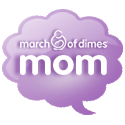(this is taken from ttmf.org)
Adjusted Age
Also known as "corrected age." This is your child's chronological age minus the number of weeks he or she was born early. For example, if your 9-month-old was born 2 months early, you can expect him or her to look and act like a 7-month old. Usually you can stop age-adjusting by the age of 2 or 3.
Anemia
A condition in which the red blood cells in the blood — measured by a hematocrit, or "crit" — are lower than normal. Red blood cells carry oxygen and carbon dioxide to and from tissue
Apnea
Cessation of breathing lasting 20 seconds or longer. Also known as an apneic episodes or apneic spells. It is common for premature infants to stop breathing for a few seconds. They almost always restart on their own, but occasionally they need stimulation or drug therapy to maintain regular breathing. The heart rate often slows with apnea; this is called bradycardia. The combination of apnea and bradycardia is often called an A&B spell.
Apnea gradually becomes less frequent as premature infants mature and grow. There is no relationship between apnea and sudden infant death syndrome (SIDS).
Aspiration
1. The accidental sucking in of food particles or fluids into the lungs.
2. Removal of a sample of fluid and cells through a needle.
Blood Gas
A blood test used to evaluate an infant's level of oxygen, carbon dioxide and acid. This test is significant because it helps to evaluate an infant's respiratory status.
Bradycardia (“Brady”)
An abnormally low heart rate. Bradys are usually associated with apnea in premature infants. During these spells the infant will stop breathing for at least 15 seconds and the heart rate will start to slow, also referred to as an "A&B spell." Gentle touching or other stimulation almost always restarts the breathing and increases the heart rate. Medications (theophylline or caffeine) are often used to treat these spells in newborn babies.
Charge Nurse
The registered nurse who has general responsibility for coordinating the nursing care of all babies in a unit for a particular shift. Nursing shifts may be either 8 or 12 hours.
Continuous Positive Airway Pressure (CPAP)
Supplemental oxygen or room air delivered under pressure though either an endotracheal tube (tube that goes directly into the infant's lungs) or small tubes or prongs that sit in the nostrils. Delivering oxygen under pressure helps keep air sacs in the lungs open and also helps maintain a clear airway to the lungs. Nasal CPAP (NCPAP) is commonly used immediately after removing the endotracheal tube to treat apnea and/or prevent the need for an endotracheal tube and ventilator.
These are ones that I used regularly when blogging or where often uttered in the NICU when I was there. My son was on a CPAP for part of his time...and initially had a lot of Brady's and issues with aspiration. I am still not 100% used to having to use the term adjusted age - which for Parker is just about 14.5 months.
Tomorrow begins my journal journey wednesdays...I look forward to sharing with you what went through my mind as I was with Parker in the NICU each day.
Please know that if you have a question or would like certain information to be posted, I'd be happy to do so!








1 comment:
Oh Denise you have brought back memories for me with this post. I remember how the terms of the NICU scared me when I first heard them. I think it is great that you are doing this. So many babies are born prematurely any information put out there to help others board that roller coaster and have less anxiety and fear is FANTASTIC. I remember being overwhelmed by the machines and tubes as well. Thank You
Post a Comment